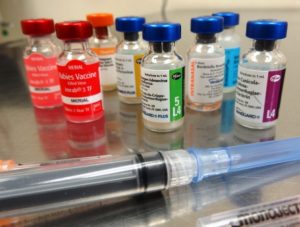How Vaccines Do (And Don’t) Work
So, we’ve talked about the diseases we commonly vaccinate for in the first (canine) and second (feline) articles. Now we’ll offer up some answers for the questions we commonly field about vaccines.

How do vaccines protect my pet from disease?
That’s a deceptively simple question, considering how complicated Muffy’s immune system is. The basic idea is easy enough to grasp, however. In order for your immune system to fight off an invading disease, it first needs to identify it. In the cellular soup that is the living body, when something new and harmful comes along it can take some time to recognize it – time you often don’t have when under attack by disease. Remember how much of the town got wiped out in Invasion of the Body Snatchers before folks figured out how to tell who’s who? So, vaccines contain bits of the offending virus or bacteria that have been rendered harmless, giving your immune system a “heads up” on what to look for if infected in the future. That means they can take care of the enemy before it becomes a problem, instead of wasting time trying to figure out who the enemy is.
What’s actually in those vaccines?
There are three basic types of vaccines.
- Killed vaccines are basically busted-up bits of a virus or bacteria. They contain important proteins your immune system can recognize and learn to differentiate in the future, but everything’s dead so the virus or bacteria can’t spread or cause disease.
- Modified live vaccines actually can multiply in the body, but they’ve been altered by the kids in the lab so they no longer cause disease. These generally produce much better immunity since your immune system gets exposed to a lot more virus.
- Recombinant vaccines take the best of both worlds – generally, a harmless virus (yup, probably the majority of viruses out there cause no real harm) is injected with a few genes that allow it to produce a few proteins that are specific to the disease we want to vaccinate against. It’s sort of like a good samaritan going door-to-door with photos of annoying door-to-door salesmen so you know when not to open the door.
Are vaccines 100% effective?
Realistically, nothing is 100%, but most manufactures claim efficacy of 100% or at least the upper 90’s for the “core” vaccines. Non-core vaccines like leptospirosis, FeLV, and FIV sport lower numbers but are generally still pretty good – in the case of lepto, sometimes even if disease isn’tprevented, a reduction in severity could be life saving.
It’s also worth noting that a very small percentage of animals will be “non-responders” to a particular vaccine – for whatever reason, there immune system won’t recognize and mount a response. Another potential reason for failure is mishandling of the vaccines, which generally are sensitive to temperature – this is the main reason buying and giving vaccines yourself is a bad idea. I threw out $800 worth of vaccines a few months back when a refrigerator died over the weekend – I frankly don’t trust the kid at the feed store or the businessman running a mail-order outfit to do that.
What’s “herd immunity?”
Okay, so no one’s ever actually asked me about the concept of herd immunity. But it’s worth bringing up here. Basically, the idea is that if you create immunity to a disease in a majority of a population through vaccination, the individuals who don’t develop immunity (from failure or lack of vaccination) get a sort of second-hand protection, since you’ve drastically decreased the odds of them being exposed to the disease. Imagine 100 people in an office. If 90 of them get flu shots, you’ve just reduced the risk of exposure to the flu at the office by 90% for the other 10 folks. So, even if a vaccine isn’t 100% effective for everyone, if everyone gets it they’ll be well protected regardless (and that’s how you end smallpox, kids). As an aside, this is why I tend to think of vaccination (both animal and human) as a social responsibility – those 10 folks who didn’t get the flu shot are not only freeloading on everyone else’s vaccines, but they’re serving as a potential reservoir for the disease, too.
So, two big questions remain – how frequently should pets be vaccinated, and what are the risks of vaccinating (hint: they’re a lot less than not vaccinating). We’ll get to them next, but for now I’ll let “herd” immunity serve as an excuse to leave you with the following video.
